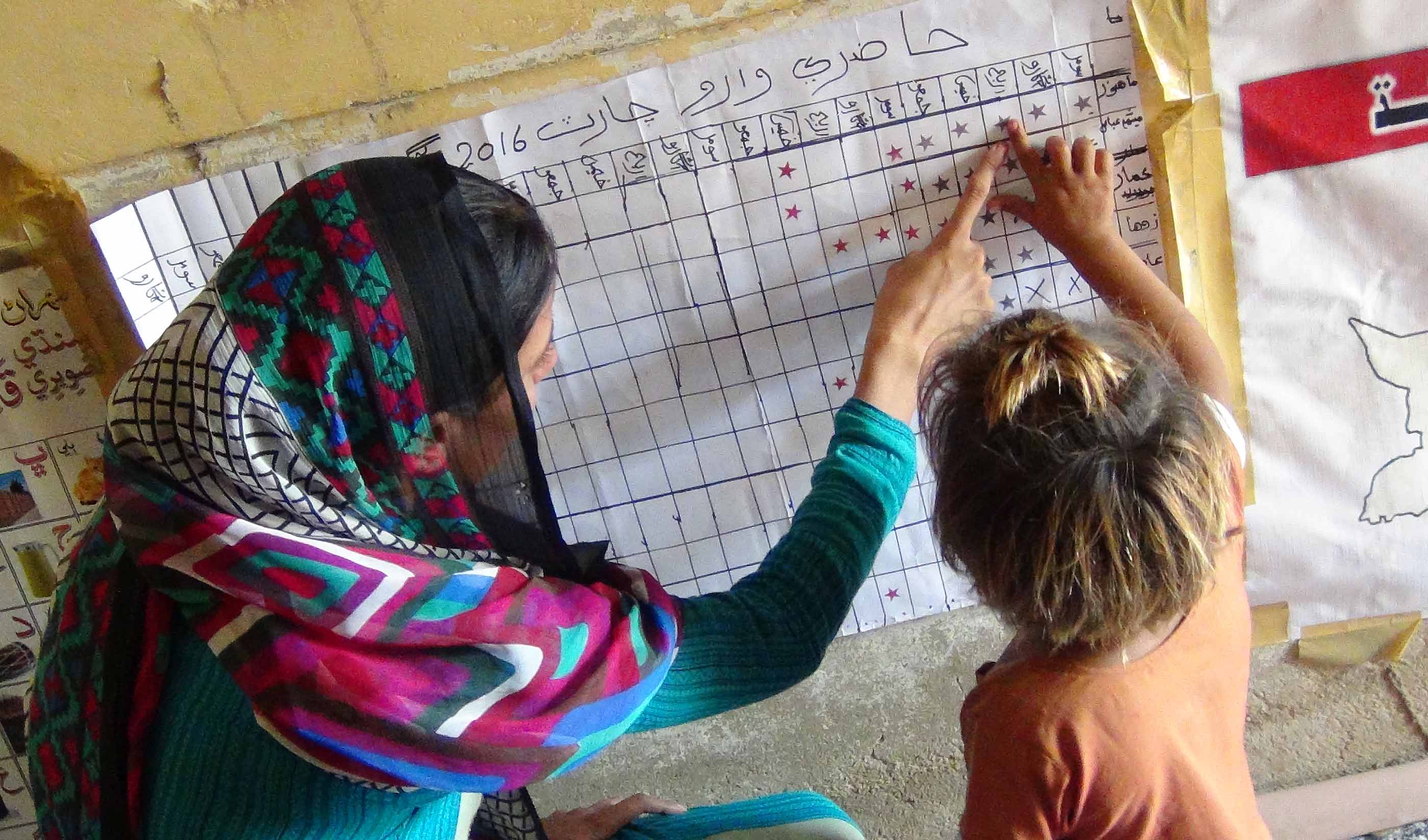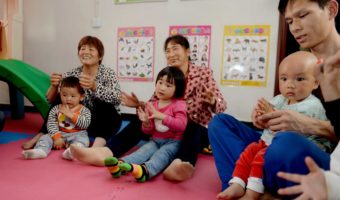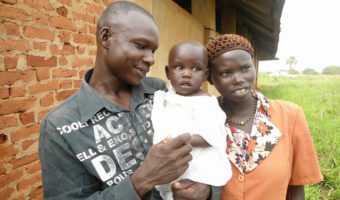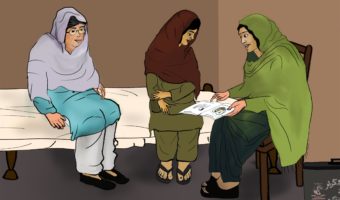Investments in programmes for young children, adolescents and youth are critically important to prepare the next generation with the knowledge, competencies and skills to contribute to social and economic development in their communities. Unfortunately, access to early childhood care and education (ECCE) opportunities remain limited: only 33% of 3–4 year olds in low- and middle-income countries attend ECCE services, inequalities in education persist in adolescents (10–19 year olds) and youth (15–24 year olds), and 30% of youth are neither in employment, education nor training. The United Nations Sustainable Development Goals (SDGs) recognise these interrelated challenges and promote lifelong learning starting at birth (Goal 4), and economic development for young people (Goal 8). Directly addressing Goals 4 and 8 of the SDGs, LEAPS (Youth Leaders for Early Childhood Assuring Children are Prepared for School) is an innovative youth-led strategy designed to improve access to quality ECCE services as well as promoting skills development for young people.
Why a cross-generational approach for early childhood and youth development?
The SDGs encompass lifelong learning from birth to youth and adulthood (SDG 4) and economic opportunities for youth (SDG 8). Cross-generational approaches offer new avenues for simultaneously supporting the development and learning of young children and youth. The first five years of a child’s life are a sensitive period of brain development when interventions such as ECCE can reduce the risk of poor development and establish a strong foundation for lifelong learning and well-being. Late adolescence and youth are also periods of sensitive brain development, when more complex learning and social-emotional growth occur. In both periods, executive functions develop (for example, regulation of emotions, social skills, reasoning and problem-solving skills) which are essential for success in school and at work, and for fostering healthy and happy relationships (Centre on the Developing Child, 2012). Cross-generational programmes that train youth to deliver ECCE can strengthen their executive functions, which in turn benefits the development of the young children they support. From a programmatic perspective, cross-generational innovations can both increase access to quality ECCE providers and services (Black et al., 2017; Richter et al., 2017) and offer new opportunities for employment, education and training for youth living in rural communities (Patton et al., 2016).
Like many other low- or middle-income countries, Pakistan faces challenges in providing adequate services for young children and youth; for example, in 2013 only 23.7% of 4 year olds were in preschool, with disparities for girls, children living in rural communities, and children from the poorest households (Unicef, 2013). Young people comprise 33% of the Pakistani working-age workforce, and youth employment, education and training opportunities are in high demand (Mahmood, 2011). It was in this context that LEAPS was developed and piloted.
LEAPS: youth-led early childhood care and education in Pakistan
LEAPS was developed following formative research with families, youth, communities and local government to characterise enablers and challenges to implementation and to inform the content of the curricula for children and youth. Successful features of youth-led services were identified from the literature and used to develop LEAPS. Key features identified included an intention to benefit youth participants’ communication and leadership skills and access to mentoring (Ponguta et al., 2018). Interviews with community stakeholders explored the challenges and enablers for young children’s participation in ECCE and the acceptance of youth as ECCE service providers. The ECCE curriculum was developed through a review of global best practices, and aligned with the Government of Pakistan’s school readiness indicators for the early years.
LEAPS was implemented in nine villages in Sindh province (January 2016 to March 2017) in partnership with a district office of the National Commission for Human Development (NCHD). The local community provided space for the ECCE centres, while the LEAPS team provided the furniture, learning materials, training and mentoring.
Female community youth leaders (CYLs), aged 18–24 years, were trained to deliver ECCE. The CYLs received a one-month basic training, including classroom practice. Following the basic training, CYLs received twice-monthly on-the-job coaching and mentoring visits from a LEAPS mentor and participated in Communities of
Practice to support professional development. CYLs received a monthly stipend and transport support to enable their participation in training sessions and meetings.
The CYLs ran two classes per day, five days per week. Each class ran for three hours for 20 children. To ensure community engagement, family members were invited to spend time and volunteer at the LEAPS centres. Regular parent meetings were organised, as well as meetings of the CYL with the village community primary school teacher and community health worker, distribution of LEAPS newsletters, and town hall meetings with district officials.
‘Interviews with community stakeholders explored the acceptance of youth as early childhood service providers.’
Lessons learned from the LEAPS pilot
The LEAPS programme was evaluated in a randomised controlled pilot trial. Benefits were found on children’s school readiness and for the CYLs. The following characteristics were identified for implementing a successful youth- led ECCE programme (Yousafzai et al., 2018; Franchett et al., in press).
Recruitment of CYLs
Common traits in the shortlisted candidates were: an expressed desire to continue their learning and education; creativity; and a sense of responsibility to contribute to their community’s development. Candidates participated in a one- day workshop for recruitment based on their attitudes and comfort level when working with young children; their observation and communication skills; their creativity; and their ability to work in a team.
Important components of the CYL training and mentoring
In addition to training to deliver quality ECCE, the training and mentoring programme focused on the professional development needs of the CYLs. This included managing stress, career counselling, and problem solving to deal with challenges encountered in families and communities with respect to pursuing training and employment opportunities.
Benefits for the CYLs
We found a range of professional and personal benefits for the CYLs, such as critical thinking skills, peer and social support, and an increased perception of empowerment, self-efficacy and independence. In addition, some CYLs expressed an intent to pursue higher education after their participation in LEAPS, while others shared how their taking part in LEAPS had led to other girls and young women in their families being able to pursue employment and education opportunities.
Building acceptance in the community for youth-led ECCE
Community support for and acceptance of youth-led ECCE were essential for the success of the programme. Parents of young children need to trust and value the ECCE provider; therefore, community participation in recruitment, community sensitisation, and opportunities for CYLs to engage with the community throughout the programme were important elements of LEAPS.
Next steps
The LEAPS project team is working on two initiatives:
- Funded by Dubai Cares and the Saving Brains programme from Grand Challenges Canada, we are working in partnership with the NCHD in Pakistan to implement LEAPS in four districts there. The first goal is to evaluate the impact of LEAPS at scale, and the second is to build readiness in a government system to implement, monitor and improve programme quality.
- Funded by the Hecht Global Health Faculty Network Award and the Jacobs Foundation, at Yale University, we are conducting a formative assessment with local stakeholders to determine the feasibility of implementing and adapting LEAPS for the Colombian context.
Overall, youth-led ECCE may be an attractive option for countries where employment and training opportunities for youth are limited and gaps in the coverage of quality ECCE services remain substantial.
References can be found in the PDF version of the article.
VIDEO: Interview with authors



